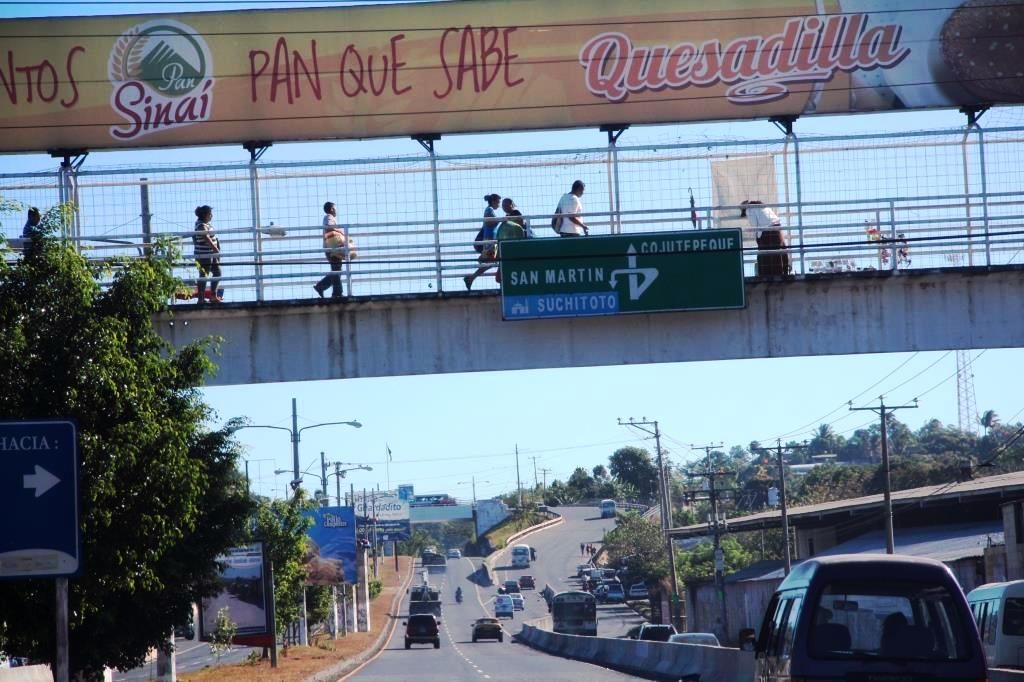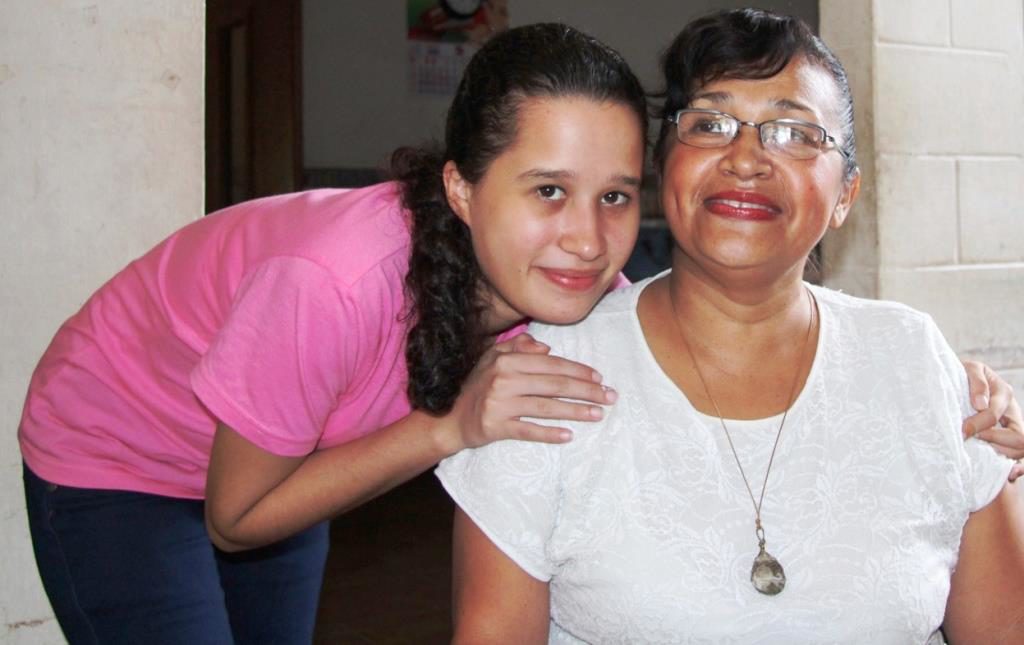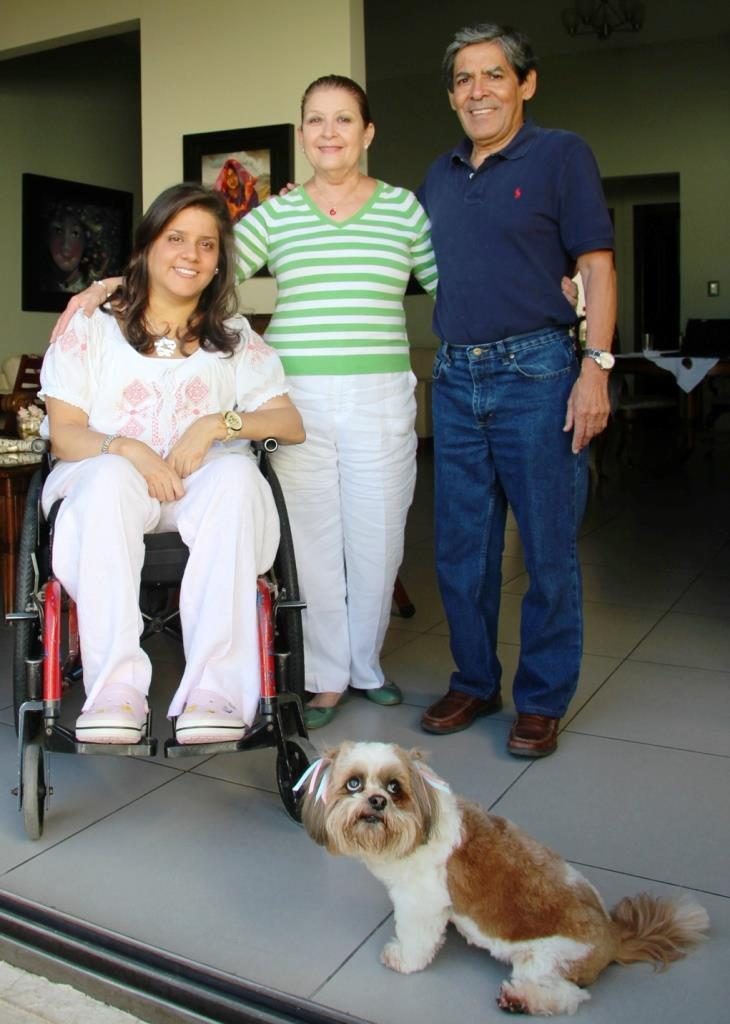It is not uncommon to see individuals in wheelchairs out on busy highways in major traffic in San Salvador. Why? Curb cuts are few and far between, and it’s simply easier (but oh so dangerous) for those in wheelchairs to navigate the level streets. In the busier metropolitan areas of multi-lane traffic, the “bridge-like” structures over the highways for pedestrians to cross safely simply do not accommodate physically challenged persons.

Even wheelchair-bound people fortunate enough to have vans equipped with lifts find that handicapped spots designated for them at shopping and business areas typically are not respected and left for them. Businesses often do not have elevators. In short, accessibility for the handicapped is not a right in El Salvador. If your mobility is restricted to a wheelchair, you cannot depend on any degree of standard help.

An Aide awaits assisting a physically challenged woman into her private wheelchair in an adapted van.
Education is another limited area for challenged people in El Salvador. Those who have special needs are excluded from schools. Their families are expected to care for them without resources or support. We met a mother of two autistic adult men who had never received any kind of intervention or services. They were unable to communicate; their families unaware of augmentative communication devices that may be able to help them including a simple picture board to point to their wants/needs. Consequently, their behaviors were out of control – yes, that is what typically happens when frustrated from being unable to communicate – and these men were strong adults living with petite women in the home. I feared for their safety. The community ostracized the family. It was heart-breaking. I wanted to hire and bring a speech clinician to them which they should have had years ago.
On our last trip we watched a young Down’s syndrome adult woman sit at a table being fed fruit on a fork one piece at a time by her elderly mother. Being a former early intervention specialist for special needs kids, I felt furious! In our area of the U.S. “birth to three” services begin for special needs infants from the day they are born; provided free by the Human Services System. At age three they transition into the education system via Early Intervention until age five. At that point they move into the public school system. Chances are this Down’s Syndrome girl would have been self-feeding by age three if she had she been born in another location. What happens to this challenged Salvadoran woman without self- help skills when her elderly mother dies? I remind myself I am witnessing life in a developing country where these services are unavailable at the moment, at least for those living in outlying campesino communities.
Employment is another huge issue for all who are challenged in any way. Employers do not want to take a chance on hiring anyone who appears out of the norm regardless how intelligent, creative, or talented that person may be. In short, employers often discriminate against disabled or handicapped individuals.

Within San Salvador a group (ACOGIPIPR -Asociacion Cooperative del Grupo Independente Pro Rehabilitacion) Integral advocates through the required political channels for more equitable standards and rights for citizens with challenges. Those challenges may include any number of physical, mental, or sensory issues that make their needs different from the general population. December 3 is the Salvadoran “Day for Disabilities” commemorating when this group presented a bill asking for equality and opportunity for all. It was presented to the mayor’s office and national assembly for passage.


This group recognizes that the infrastructure of the country needs to improve in order to accommodate accessibility for physically challenged persons. They have an ombudsman working with them to help government officials realize that civil rights have been violated and needs are needed. One of the specific items they hope to put in place is city busing for the handicapped.
There is also the social matter of public acceptance. It is an issue of changing the mindset of Salvadoran society to accept and integrate those living with challenges into society. The end goal for the challenged segment is to live with dignity and to enjoy all the same civil rights as anyone else.

The hope of this advocacy group is to change and improve conditions now so that the next generation does not need to continue defending each individual right. Much hinges on the results of the proposed bill. This group is not looking just at a small group of self-interests, but at the entire Salvadoran sector whose needs have been violated and overlooked for far too long.
NOTE:
Due to anticipated changes in re-focusing our Salvadoran ministry during the near future, we will be offering one story per month, rather than our customary two, alternating between a personal story of witness and a travel story.
We hope you will continue to read our website while we clarify our goals.
Thank you for your support.


